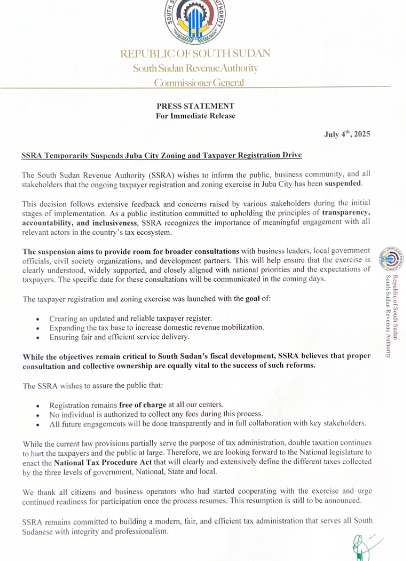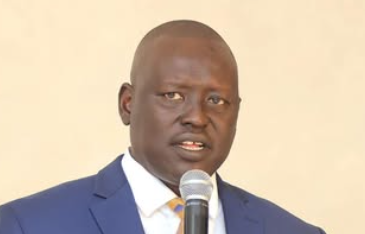The South Sudan Revenue Authority (SSRA) suspended the planned exercise to zone Juba City and register taxpayers door-to-door on Friday.
SSRA Commissioner General Simon Akuei Deng said the decision follows extensive feedback and concerns raised by various stakeholders during the initial stages of implementation.
“As a public institution committed to upholding the principles of transparency, accountability, and inclusiveness, SSRA recognizes the importance of meaningful engagement with all relevant actors in the country’s tax ecosystem,” he said in a statement seen by Radio Tamazuj.
“The suspension aims to provide room for broader consultations with business leaders, local government, officials, civil society organisations, and development partners,” Akuei explained. “This will help ensure that the exercise is clearly understood, widely supported, and closely aligned with national priorities and the expectations of core taxpayers.”
He noted that the specific date for these consultations will be communicated in the coming days, and that the taxpayer registration and zoning exercise was launched to create an updated and reliable taxpayer register, expanding the tax base to increase domestic revenue mobilization and ensuring fair and efficient service delivery.
Central Equatoria State Acting Information Minister Jacob Aligo Lo-ladu welcomed the move to suspend the registration of taxpayers in Juba City, saying it was in contravention of the law.
“It violates Article 49 of the Transitional Constitution of South Sudan 2011, as amended, which calls for intergovernmental linkages, where the national government is supposed to be linked to the local government through the state,” he said. “They (SSRA) did this thing without any due process, no consultation, and we just heard it on SSBC (TV), declaring this zoning.”
“So, the Central Equatoria State Government protested that decision and requested that the Commissioner General of the relevant authorities revoke that decision, pending further consultation with the relevant levels of government, in this case, the government of the state, Juba City Council, and Juba County,” he added.
For his part, Dr. Abraham Maliet, a prominent South Sudanese economist and senior advisor within the National Government’s Economic Cluster, said the move by the Revenue Authority was in contravention of the law.
“There is a lot of work that needs to be done in what we call tax demarcation. We need to sit down with the state and local government to demarcate that every entity should have its jurisdiction,” he stated. “You do not collect [tax] anyhow because there are taxes that belong to the state and the national government.”
“The state has every right to reject, we need to talk first, we need to sit down to demarcate, who collects where and what, it is a process you cannot just make a policy or statement that this is what I want to do because this is a very contagious area,” he added.
Meanwhile, Ter Manyang Gatwech, a civil society activist, said the initial move by the Revenue Authority was unilateral and therefore there is a need to consult the relevant authorities.
“They need to meet the Central Equatoria State Government together with the Juba City Council, and then they should have a meeting,” he said. “The majority of South Sudanese are unemployed, which is a serious thing. If you want to pay taxes to your government, you should have a decent job to fulfill the constitution.”
Manyang added that there are issues of transparency in tax collection and utilization of public funds, and citizens who pay tax want to see services like health care, roads, and education, among others.





